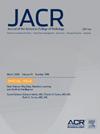ACR Appropriateness Criteria® Pretreatment Staging of Urothelial Cancer: 2024 Update
IF 4
3区 医学
Q1 RADIOLOGY, NUCLEAR MEDICINE & MEDICAL IMAGING
引用次数: 0
Abstract
Urothelial cancer is the second most common cancer, and cause of cancer death, related to the genitourinary tract. The goals of imaging for pretreatment staging of urothelial cancer are to evaluate for both local and distant spread of the cancer and assessing for synchronous sites of urothelial cancer in the upper tracts and bladder. For pretreatment staging of urothelial carcinoma, patients can be stratified into one of three groups: 1) nonmuscle invasive bladder cancer; 2) muscle invasive bladder cancer; and 3) upper urinary tract urothelial carcinoma. This document is a review of the current literature for urothelial cancer and resulting recommendations for pretreatment staging imaging.
The American College of Radiology Appropriateness Criteria are evidence-based guidelines for specific clinical conditions that are reviewed annually by a multidisciplinary expert panel. The guideline development and revision process support the systematic analysis of the medical literature from peer reviewed journals. Established methodology principles such as Grading of Recommendations Assessment, Development, and Evaluation or GRADE are adapted to evaluate the evidence. The RAND/UCLA Appropriateness Method User Manual provides the methodology to determine the appropriateness of imaging and treatment procedures for specific clinical scenarios. In those instances where peer reviewed literature is lacking or equivocal, experts may be the primary evidentiary source available to formulate a recommendation.
ACR Appropriateness Criteria® 尿道癌治疗前分期:2024 年更新版。
泌尿道癌是泌尿生殖系统第二大常见癌症,也是导致癌症死亡的原因。对尿路上皮癌进行预处理分期成像的目的是评估癌症的局部和远处扩散情况,并评估上尿路和膀胱中尿路上皮癌的同步部位。尿路上皮癌的预处理分期可将患者分为三组:1)非肌肉浸润性膀胱癌;2)肌肉浸润性膀胱癌;3)上尿路尿路上皮癌。本文件回顾了目前有关尿路上皮癌的文献,并对预处理分期成像提出了建议。美国放射学会适宜性标准是针对特定临床情况的循证指南,每年由一个多学科专家小组进行审查。指南的制定和修订过程支持对同行评审期刊上的医学文献进行系统分析。已确立的方法原则,如 "建议评估、发展和评价分级"(GRADE),被用来评估证据。兰德/加州大学洛杉矶分校《适宜性方法用户手册》提供了确定特定临床情况下成像和治疗程序适宜性的方法。在缺乏同行评议文献或文献不明确的情况下,专家可能是制定建议的主要证据来源。
本文章由计算机程序翻译,如有差异,请以英文原文为准。
求助全文
约1分钟内获得全文
求助全文
来源期刊

Journal of the American College of Radiology
RADIOLOGY, NUCLEAR MEDICINE & MEDICAL IMAGING-
CiteScore
6.30
自引率
8.90%
发文量
312
审稿时长
34 days
期刊介绍:
The official journal of the American College of Radiology, JACR informs its readers of timely, pertinent, and important topics affecting the practice of diagnostic radiologists, interventional radiologists, medical physicists, and radiation oncologists. In so doing, JACR improves their practices and helps optimize their role in the health care system. By providing a forum for informative, well-written articles on health policy, clinical practice, practice management, data science, and education, JACR engages readers in a dialogue that ultimately benefits patient care.
 求助内容:
求助内容: 应助结果提醒方式:
应助结果提醒方式:


